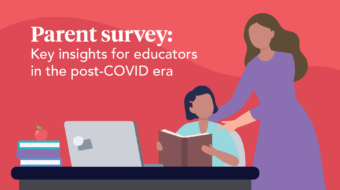This post is the third in a series based on a transcript from a recent Q&A with Dr. Barry Prizant as part of his webinar, “Family Collaboration: An Essential Element for SPED Success.” Questions came directly from audience participants — special education directors, special educators, speech-language pathologists, and parents, and answers are from Dr. Prizant. Click here to see additional questions from the Q&A.
How are the issues of family engagement different for families with children with special needs compared to those families of children who are developing more typically? Would you use different strategies? Would these strategies apply to students who are going to a private school as opposed to a public school? Do these approaches work across groups or is they specific to special education?
I do believe they work across groups. Certainly when we are talking about successful family engagement, some of the themes I discussed to go for parents of typically developing kids as well as parents of kids with special needs, but then we have to understand the special layer of challenges that we face when children have special needs. So for example, this notion of uncertainty, that for typically developing kids, parents will expect that their child will progress in school, that they will be in the mainstream curriculum, that they will be in a regular classroom if you will, on full time with typically developing peers. A lot of those issues are in question with kids with special needs; and that of course depends upon the philosophy of the school district, so a school district that has partial inclusion or more self-contained classrooms, those are issues that are uncertain to parents: Will my child be with friends who are typically developing? Will my child be with kids that my son or daughter sees in the neighborhood? Or is it going to be with other kids who have special needs?
In many cases the special supports that have to be in place, place a special layer of obligation on our part when a child has special needs. So for example, for a typically developing child, a teacher who is cognizant of the importance of letting kids know what is going to happen during the day, just might write it down on the blackboard and speak to the class. But for a child with significant developmental disabilities and communication disabilities, that child might need to have a visual schedule that is designed specifically for him or her. When we talk about these special supports, obviously it gets to the question of how do we educate parents about those supports. How do we support parents in implementing those supports outside of the school environment as well. So to answer to the question, once again, I think that all those themes of listening to parents, of reducing uncertainties, of helping parents to be able to express their concerns that are common across all children. But because of the special considerations and needs of special needs kids, we have this whole other layer that actually dictates that we engage with families in slightly different ways, that we give them more time. That maybe we are going to be more concerned about the home environment because of the impact of the child with special needs in terms of support or lack of support across different environments.
The answer is yes and no. We would need different strategies, but in general the themes of supporting a parent’s knowledge of what is coming up with the expectations, what are school’s expectations for how the child engages, about their behavior, some of those things might be similar.
Dr. Barry Prizant is a clinical scholar, consultant, researcher and expert on childhood communication disorders. His new book, “Uniquely Human: Seeing Autism Through a Different Lens” is scheduled to be released in August, 2015 by Simon and Schuster. To contact Dr. Prizant for a consultation or workshop in your district, visit https://www.barryprizant.com/.



